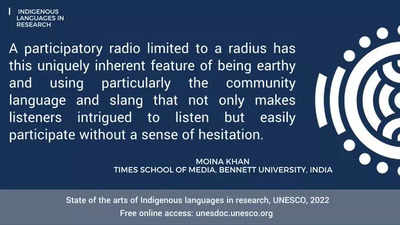UNESCO tweets TSoM Faculty's work

It is not always that a UN organization notices an academician’s work. It was therefore a matter of satisfaction and pride for Dr. Moina Khan, Associate Professor, Times School of Media, when
The excerpt was from a research paper, titled, Community Radio in
The research paper was invited by UNESCO to mark the beginning of
According to UNESCO, “Overall, 278 research papers were submitted in 2019, in English, French and Spanish by researchers, experts, and practitioners from 63 countries.” The research papers were reviewed by an international peer review team, including leading linguists, Indigenous researchers and experts with different specializations, under the guidance of a chief researcher and editor. “Each paper was reviewed by more than one expert and by the UNESCO IYIL2019 Secretariat. Through this process, 39 research papers (27 in English, 4 in French, 8 in Spanish) were selected for publication,” UNESCO stated.
Khan’s research work uses case study methodology to examine the importance of local language-based media system in preserving and sustaining native language and culture. The publication can be accessed through UNESCO’s digital library State of the art of indigenous languages in research: a collection of selected research papers - UNESCO Digital Library

Later, on May 20, Dr. Khan presented her research work at a webinar and engaged in a dialogue on the state of indigenous language research across various areas. The webinar was live streamed on UNESCO website.
Says Khan, “The research papers in this collection contributed to the identification of existing knowledge gaps in sectors of indigenous languages, paving the way for new research routes within the broader context of the International Decade of Indigenous Languages (IDIL2022-2032), for which UNESCO acts as a lead UN agency.”
Join exciting programmes offered by Bennett University










Recent Messages ()
Please rate before posting your Review
SIGN IN WITH
Refrain from posting comments that are obscene, defamatory or inflammatory, and do not indulge in personal attacks, name calling or inciting hatred against any community. Help us delete comments that do not follow these guidelines by marking them offensive. Let's work together to keep the conversation civil.